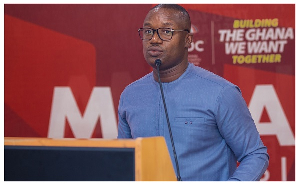Minister for Energy, John Abdulai Jinapor has made a pledged to ensure Ghana’s energy sector is in a better state of being that what was handed over to him by the past government.
He admitted that there are many challenges in the sector, particularly frequent power outages frustrating citizens nationwide.
Speaking in an interview, Jinapor admitted that power issues have long plagued the nation, emphasizing that the current administration inherited significant energy problems from its predecessor.
“In fact, as far back as December, when we were about going into the election, and that was the last month of the NPP administration, they were shedding about 500 megawatts of power. And if you look at the whole of 2024, virtually every month there was load shedding.”
Jinapor stressed that as Energy Minister, the responsibility ultimately rests on him, regardless of issues within agencies like ECG, GRIDCo, or the Energy Commission.
“What people know is that there is a Minister appointed by the President to supervise the sector. Legitimately, the people of Ghana will always hold the Minister responsible. And by that, I take full responsibility.”
He also acknowledged President John Dramani Mahama’s confidence in his ability to fix Ghana’s power challenges.
“I’ve been Deputy Minister before. I have virtually acted before in this sector. And now I’m the substantive Minister. And so I understand the enormity of the challenge”.
Despite the difficulties, he remains committed to turning the sector around, assuring Ghanaians that he will do whatever it takes to stabilize power supply and improve the industry.
“By the time I leave office, this sector will have been much, much better than I inherited,”.
Jinapor’s comments come as load shedding continues to impact households and businesses, fueling concerns over Ghana’s energy stability and infrastructure development.
His assurance comes days after Finance Minister, Dr. Cassiel Ato Forson and IMF Mission Chief for Ghana, Stéphane Roudet both stated that Ghana’s energy sector presents the most significant threat to the nation economically.
Dr. Forson earlier indicated that the energy sector is burdened with a financial shortfall of approximately $2 billion, an amount that surpasses the nation’s domestic capital expenditure.
He made this revelation during a deep-dive session on the Ghana Energy Compact under Mission 300 at the WorldBank.
Dr. Forson emphasized the urgent need for comprehensive reforms in the energy sector. He warned that the size of the deficit exceeds the country’s total domestic capital expenditure and cannot be addressed by tariff adjustments alone.
“The problem is not just tariffs. The inefficiencies, especially in the distribution sector, are being passed on to the ordinary Ghanaian, making electricity costs unnecessarily high,” he stated.
Stéphane Roudet addressing journalists in Ghana reiterated the Fund’s persistent concerns over the sector’s financial weaknesses, noting that energy sector reform remains a key pillar of Ghana’s IMF-supported program.
Speaking to Ghanaian journalists during the recently concluded IMF Spring Meetings in Washington, D.C., Roudet underscored the importance of addressing the gap between the revenue collected by the Electricity Company of Ghana (ECG) and the actual cost of electricity production, a long-standing issue since the start of the program.

